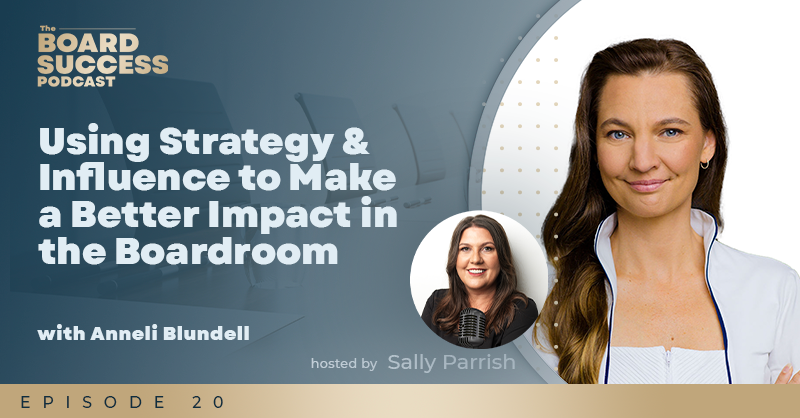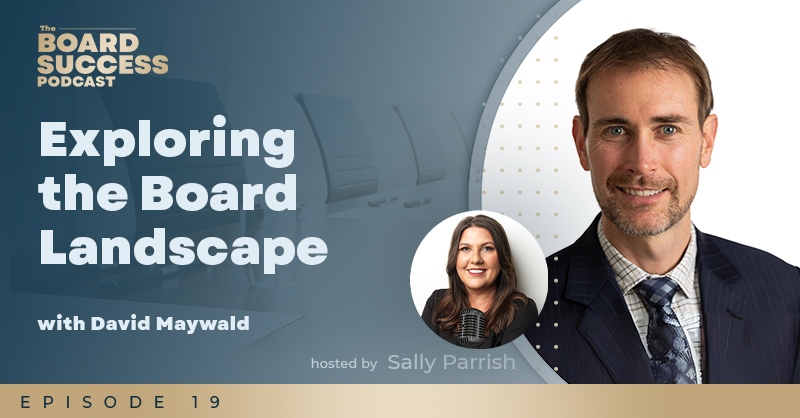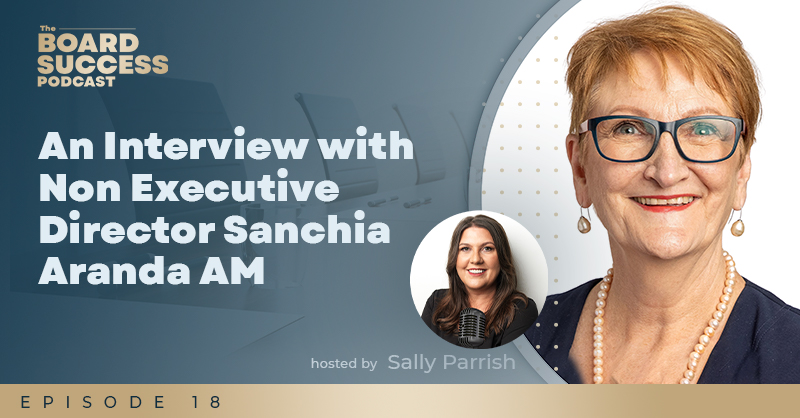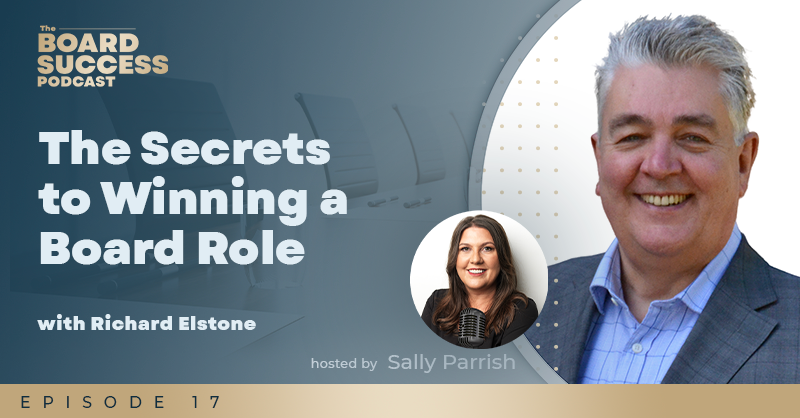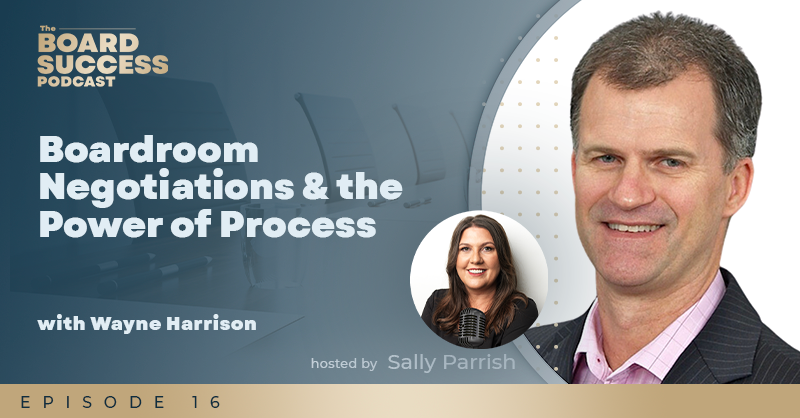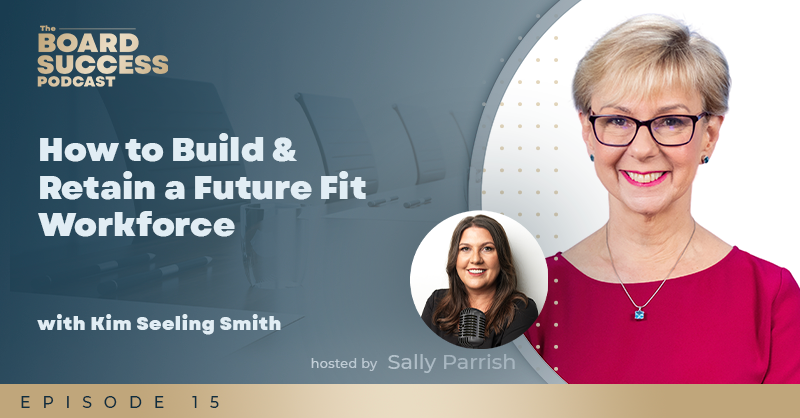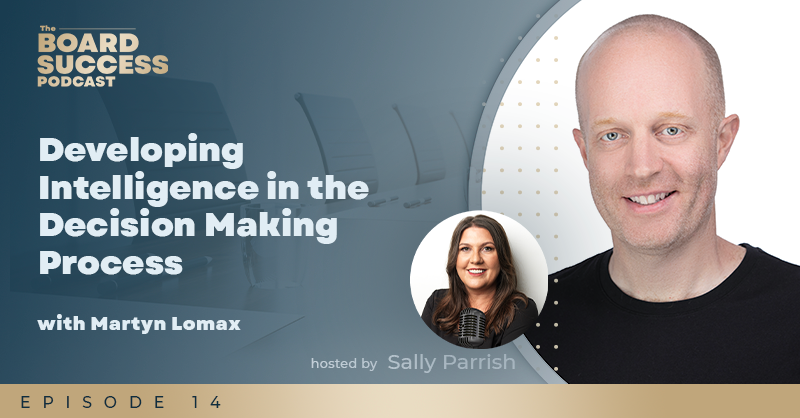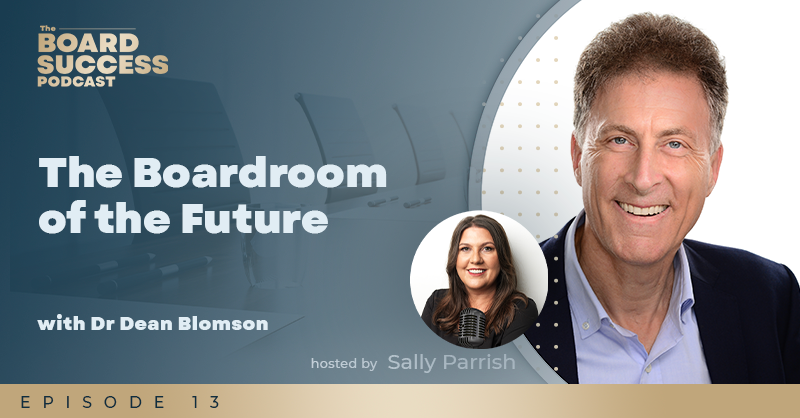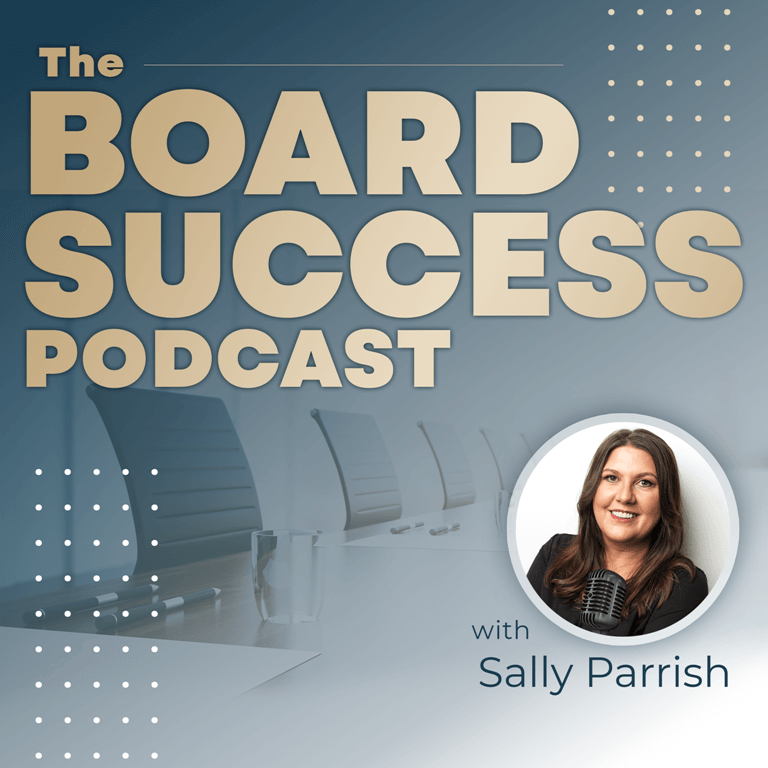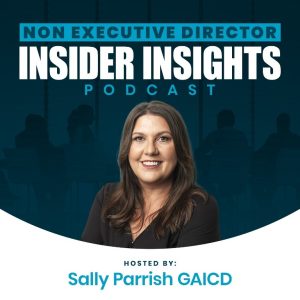An Interview with Non Executive Director Wendy Stops
Sally Parrish interviews ASX Chair Wendy Stops
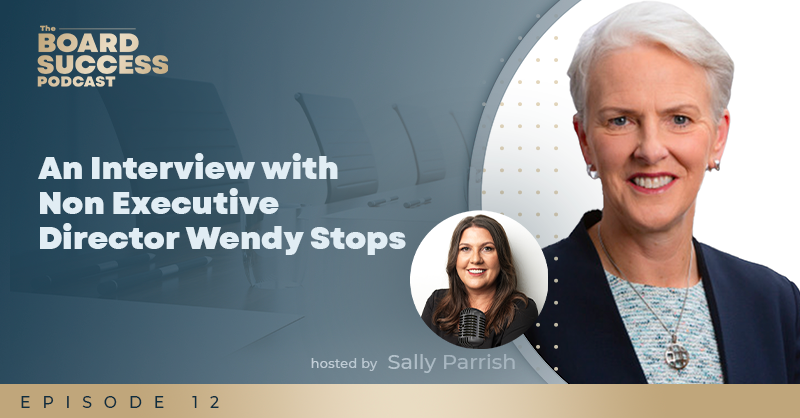
Another replay from our sister podcast "Non Executive Director Insider Insights" featuring ASX Chair Wendy Stops.
At the time of this recording, Wendy was a Non Executive Director of the Commonwealth Bank, Coles Group Ltd and Fitted for Work, and Chair of the Industry Advisory Board for the Centre for Business Analytics at the Melbourne Business School. Since then, she has also become Chair of Blackmores and Deputy Chancellor at the University of Melbourne. She completed her tenure at CBA in Oct 2020 and went on to join the board of Blackmores.
Wendy shares her insights on how to make securing your seat on a board possible, with tips on networking and establishing yourself as a leader.
FURTHER INFORMATION
LinkedIn: https://www.linkedin.com/in/wendystops/
Click Here to View the Podcast Interview Transcript with Wendy Stops
Sally Parrish 01:03
So if you've been following this podcast for a while now, you'd know that every once in a while there's a very special episode, where we release an episode of our sister podcast, the Non Executive Director Insider Insight podcast. So today, here's another great episode. I hope you're gonna love these hints, tips and advice from somebody who's out there and doing it. Let's play the recording.
Welcome to Insider Insights, where you get to meet Non Executive Directors and go inside their boardroom. Today we're revisiting an episode we recorded with Wendy Stops during the COVID lockdown, and her unique perspective of board life and hence some tips are just as valuable today to help you to succeed on boards.
At the time of this recording, Wendy was a Non Executive Director of the Commonwealth Bank, Coles Group Ltd and Fitted for Work. And she was the Chair of the Industry Advisory Board for the Centre for Business Analytics at the Melbourne Business School. Since then, she has also become Chair of Blackmores, and Deputy Chancellor at the University of Melbourne. She completed her tenure at CBA in October 2020. So join me now. And let's hear from our insider Wendy Stops.
Sally Parrish 02:28
Wendy, thank you so much for joining us today.
Wendy Stops 02:32
No problem. It's good to talk to you.
Sally Parrish 02:34
Now I'm really excited to hear all about your board career. If you start off by telling us what your portfolio is right now.
Wendy Stops 02:42
Yeah, my current portfolio is I'm a director on the Commonwealth Bank of Australia, the Coles Group. And I'm on the council of the University of Melbourne. And I'm also a director of a small women's charity called Fitted for Work.
Sally Parrish 02:56
That's a really nice spread that you've got there. Was that a deliberate thing that you've built? Or did it just kind of happen for you?
Wendy Stops 03:06
No, it was reasonably deliberate. When I decided I wanted to become a director, I decided I wanted to have a diverse portfolio, probably a little bit of a legacy of having been in a consulting organisation, you know, where you worked with different clients in different places. But yeah, I wanted to have a little bit of diversity in my portfolio. So I was also a director of a technology company at one point as well. So yeah, I'm quite happy with how it's ended up.
Sally Parrish 03:34
You enjoy the variety.
Wendy Stops 03:36
Yeah, I do. It makes it I guess that it's a little bit harder because you're in different industries. And I was not a banker. I was not a retailer, other than loving the shop, of course. And I didn't go to the University of Melbourne, I went to a different university so I've had to do a lot of learning. And it means you know, you're constantly switching your brain from one focus to a different focus. Yes, we focus on different dynamics, but I enjoy that I find that rewarding.
Sally Parrish 04:05
I have a NED that I spoke to, who said that she likes to get the customer experience for the organisations that she's with. So if she was on a retail board, she would go into that shop and experience it as a buyer idea. Do you ever go to that degree?
Wendy Stops 04:20
Oh, yeah, I like Coles for that reason because it's very easy to get the customer experience. I can just walk into any supermarket and they don't know who I am. Just kind of experience and ask questions and talk to the person at the checkout to see how things are going to be harder in a bank because I would have to kind of fake my experience to some extent. But certainly in a supermarket it's quite an easy thing to do and it works quite well actually.
Sally Parrish 04:52
Yeah, it can be very revealing content.
Wendy Stops 04:55
Yeah, it can. And for that reason, I'm conscious that you just got a call from someone or a bad day or something. So I kind of do it over time. The good thing about supermarkets is you're going there all the time and actually love supermarket shopping. I'm one of those people that goes up and down every aisle. So I do immerse myself in it. And, I sort of move around three or four different supermarkets and just sort of see how things are going.
Sally Parrish 05:17
So very dedicated in your research.How did you get started? What was your board break?
Wendy Stops 05:30
Yeah, my board break was a Commonwealth Bank, which wasn't a bad one to start off on. I’m a full time executive, I worked in a company that actually didn't allow you to join boards. And so I didn't have any board experience. But I had an ex colleague who had become a director, and I'd kept in touch with her quite a bit. And I talked with her about becoming a director. And so she was sort of aware and had her ears and eyes out. And I guess like anyone, once you become senior in an organisation, you tend to get approached by recruiters anyway. And sort of, are you interested? And I would always be, yes, I am. But not now. I can't join a board while I'm working. And maybe in a couple of years time or whatever. And then, when I decided to retire from executive work, I contacted her because I knew she would find out through another mutual friend we had. So I contacted her to tell her that I was retiring from my full time work. And she said, Well, that's a coincidence. She said, Because I just gave your name to the Commonwealth Bank. As someone they should talk to. She didn't realise I was about to retire. And so that's she said, look, they may think your skills are not what they really want, or whatever. And I said, Look, I'm fine. So it would be just a great experience. So just, if they want to talk to me, I'd be happy just to have one conversation. And it would just be a good experience for me because I've been working for over 30 years, for the same company for 32 years. Well, I had not been for a job interview, for a hell of a long time. So, I saw it more as an experience. And so I met with the chairman. We had a great conversation, not at all what I thought it would be but we had a great conversation. And at the end, he said, I'd like you to meet some of the other directors. So one thing led to another. And nine months later, a very long process, they asked me to join the board. So that was my first board. And of course, once you join a board, like the Commonwealth Bank, I didn't really have to put myself out there very much. I mean the people came knocking on my door.
Sally Parrish 07:34
Yes, yes, I can.
Wendy Stops 07:35
But while I was going through the process, because I always thought at some point, I was just gonna get dropped off the list. It wouldn't end up happening. And so I was doing things like talking to a member of Chief Executive Women, but there's a lot of women in that organisation who are directors and I talked to some of them about my CV, and I had to totally rewrite my CV from being a consultant CV to a potential director CV and just I did a couple of sort of half day sessions on being a director and just things like that to kind of get my head to make sure I was positioning myself as best as I could. And talking to whatever sort of recruiters came my way. And once the bank came, as I said it sort of became a bit easier after that.
Sally Parrish 08:29
Do you ever get approached? My husband worked for Telstra and everywhere someone wants to pull him up and say, Oh, well, I've got a problem with my phone. He doesn't know anything about phones. He works in the sales executive side. Do you ever find that you're an open door to the Commonwealth cases, complaints and queries?
Wendy Stops 08:47
Well, I mean, directors are always open to taking customer complaints and queries, but I don't think I've been approached too much on that. Right. I gotta tell a funny story. I was in a supermarket. This was before I joined Coles but I was in the supermarket one day and I just walked past this woman and I presume it was a daughter or someone. And I heard them say something about not being happy with the job. And my ears perked up. And so I kind of stopped, grabbed something off the shelf. And then I kind of turned around and followed them down the aisle to listen. And it was at a point when the bank had just been criticised over the insurance business. And so she was like, Oh, well, I tried to change to another bank and blah, blah, blah. And I was like, wow, I was like, getting this whole thing. I didn't actually contemplate saying to it, look, I'm a director now. I'll be here for half an hour. If I do that. I'll just listen to her. And then take that back. So but look, most times now people surprisingly, relatives like to have a complaint or a friend of a relative or something that you know, you tell your sister that this or that sort of something, but yeah, no, it hasn't been too bad.
Sally Parrish 10:01
So can you explain for an executive that hasn't been on a board before? What's that link between operational research to customer experience? And yet the board having to stay very strategic and not get involved on an operational level? Can you kind of close that loop for us?
Wendy Stops 10:23
Yeah, look, it's one of the toughest things, I think, for someone coming from an executive role into a board role is to find that right balance and the place you sort of pitch yourself between being someone that loves to dig deep into the detail, and I was one of those sort of people, and versus a director that has to kind of have more of a helicopter view, but be able to kind of go into enough detail to know what's going on. And I think when you talk about strategic versus operational, I think that for most boards, the role of the board with the company, in terms of the strategic side of that is really to help shape and form the strategy for the company. So it is, generally I say, generally, because I know, this doesn't work in all boards, but generally, it's a two way sort of thing that goes on where maybe once a year, you might have a heavy strategy session. And then there's other sessions that you have, but there's a lot of to-ing and fro-ing. And before the strategy is set in place, whereas operational obviously, it's something that's happening every day. And for the average director, who might be early days from being an executive, that's the one you tend to gravitate to, because you feel like it's more familiar to you. To look at operational things, and that's the one that's harder to find that balance because you really are there running the business, Not you? and as a director, yes, you want to ask questions, you want to be comfortable that you think they're doing the right things, that they've got the right perspective on things. They're not doing something overly risky, or whatever the case may be. So you do have to be able to probe and ask questions, and pick up on things that don't seem right, and maybe offline, looking at things in a bit more detail, that sort of thing. But ultimately, you're not telling them how to do their job. They're the executives they have to do their job. And so you're just trying to guide them, you're trying to give them the benefit of your advice, your experience, and dig into the things that you want to get comfortable with to make sure it's all covered. But yeah, you've got to find that balance between not telling them how to do their job.
Sally Parrish 12:37
Yes, yes. Because micromanaging puts them off, they don't see that as empowerment, if you're telling them what to do. It's a fine line, once that trust is broken, that's very hard to get back.
Wendy Stops 12:49
Yeah, exactly.
Sally Parrish 12:53
What are the challenges? Do you think for Non Executive Directors? What are the day to day challenges that they face?
Wendy Stops 13:01
Yeah, I think the climate for directors has been changing in Australia, particularly in the last, since the Royal Commission, compliments of the banks. But I think it's, as most people are aware of, if you're looking at the director space. The accountability is actually quite high. And I didn't go into being a director thinking, I'm going to be really accountable. Do I really want to do that? I went in there, because I thought I could really add value. And I wasn't ready to totally hang up my boots and I wasn't. Yeah, I didn't really want another full time job. So I thought it was a good opportunity for me to share my experience and my values, and so on. And that's the reason why I went to be a director. So if I think if you're very worried about the accountability, it's possibly not the right job for you. Because it does come with a reasonably high level of accountability. And depending on the industry, depending on the regulatory environment that you're working in, and so on, that could even be more so the financial services for example, as we know now on the back of the Royal Commission, and everything else is quite a highly accountable environment. It's quite public. We had this thing called bear accountability for banking executives. NED covers directors where you have to be on your toes quite a bit. Now, again, even since that's come in, I don't think that's changed how any of us behave or act, we're more conscious of it. But at the end of the day, we know if we do our job and we do our job well, then it'll be fine. But I think it is worth understanding that the accountability side is something you just need to understand and be prepared to accept depending on what industry you're going into that may be more onerous than others. I think the other challenge is what I already alluded to, which is finding that balance between being an executive versus being a director and knowing when to probe deeper versus when to know not to. When to follow up offline versus you've got it covered in the board meeting. There's just a lot of dimensions to any organisation, I think the other challenge is if, depending on what your expertise is, directors are expected particularly in Australia to be kind of across everything. You're expected to have a certain level of financial expertise, so you can understand the financials of the company, and so on. Nowadays, you're expected to have a level of technology understanding and expertise, and that's my area of specialty, so I'm fine with that. But for other directors, that's quite an uncomfortable space for them to go into, you're expected to understand the industry or learn the industry and get it. So there's you've got to have brakes. You can't think I'm going onto a board and my expertise, my executive life was in, like me information technology, and therefore, that's the skill I'm bringing, and that's where all my focus is on that board. No, it's not that. So again if you don't have some of that broader expertise, my advice would be for people to try and get some of that, before we think about financials. For example, I didn't study accounting or anything, so I was not a certified accountant. And that's been quite a challenge for me to really get on top of. Because particularly in a banking environment, it's quite a complex accounting world. So, for things like that, I think it's worth the person assessing their own skill set and looking at it and saying, Where am I strong? Where am I weak? What can I do to at least get some base level of skill and capability in the areas that I'm a bit weaker in, so that when I do go on a board, I'm not just bringing the deep expertise I have, but I've got these other now I've got a base level understanding, and I can bring insight on whatever and these other areas as well.
Sally Parrish 16:49
Yes, yeah. And that balance is quite difficult sometimes, because we do look to the IT experts to guide us. But sometimes it's the person with the least experience in that area that adds the most value because they have the most fresh outlook.
Wendy Stops 17:07
Yeah, and they just ask a dumb question. Never be afraid to ask the dumb question. Yeah,you know, people that don't have a background are usually quite happy to ask the dumb questions.
Sally Parrish 17:21
To say, I don't know, if you're in a position to answer this having got into such an amazing role straight off the bat, without any experience, but what would you say to somebody who's starting off today? What advice would you give them?
Wendy Stops 17:39
I think it's important that you think about what sort of organisation you'd like to be on the board of. So when I did speak to recruiters, in the early days, one of the first questions that always asked me was, what industries are you interested in or where? And initially, I hadn't really thought about that, other than thinking I wanted to be diverse. But I found I had to consciously think about it and say, well, I'd rather not be in this industry or that industry, I'd be cracking on that one, or this one would be okay. So I think you do have to think about, where do you want to focus your attention? Do you want to put it all into one particular industry and have multiple boards in a sort of a similar vein? Or do you want to be like me, we have more of a diverse portfolio? And if so, which industries are of most interest to you? I think that's one thing you should do, obviously, we've talked about the CV and having a board ready CV as opposed to an executive CV, but I think too, you have to think about your commitment. Because I think people can make the mistake of thinking that a board is a great second career to have, I can go from working 50 to 60 hours a week down to once a month, two days, better reading, rock up to the board meeting and it's all done. And it's definitely not that environment. You are expected to put in outside of board meetings, whether it's like the things I said before about following up or whatever learning the industry, doing surprise visits in the supermarket. So there's a lot more to it. You have to be much more switched on in your opinion, much more tapped into what's going on in the world, what's going on in your industry, regulatory, all those sorts of things. So there are a lot of outside board meeting, things you need to do. So I think you have to be clear in your mind about how many hours you want to work and how much you're prepared to put into something. Because you can come unstuck if you think it's an easy career that just works a few hours a month and that's all I have to worry about. Which unfortunately, a lot of people do think that and that's not the way it works.
Sally Parrish 19:52
Yeah, it's a myth that we're starting to challenge. Quite a lot now. Boards have changed a lot in the last 10 years. having made the court of public opinion now. Thanks to social media. But we don't only have to worry about the true stakeholders, but everybody else's opinion as well. And that's coming in real time and it gathers momentum. And it's always a try. That's instant now that feedback?
Wendy Stops 20:21
Yeah, look, it is very different. And you as a director, you have a responsibility to the company and whatever, if you're on multiple boards you've got multiple companies you're responsible to, and you have to be very mindful of what you do outside of work. If you don't want to appear on the front page of a newsletter I don't know if you are drunk one night, if you are a public figure, particularly as a director of a company, a listed company in particular. As I said, it all comes with the territory and you just need to be very mindful that now if you've been a senior executive in an organisation you would be aware of that anyway. But I think that's something to be mindful of. I think for me when you say one thing boards have changed a lot. I mean, obviously, there's been quite a big push for women on boards in the past few years. And I learned this off many years ago, in my executive role, I was listening to a panel discussion, and they had a woman who was on that company's board. And she said that she would never go onto a board if she was the first woman on the board. And she explained that because she said. Well, the reality is, it wasn't ever. But she said, she's very mindful of not being the token woman. And so here in Australia, as the push for more women on boards, or whatever has come, I've always kept that in the back of my mind, I don't want to be the token woman either. And I think for those women who are watching this video, I think it's just something to be aware of when you're going through the process. Most recruiters and companies are pretty honest, when they say look, we want to get more women on our board or whatever. They'll tell you that and that's fine. But what you need to make sure is that you will be a woman who's on a board, and you'll have the same voice as every other person sitting on that board. And whether you're the first woman or you're the second or third or fourth, or whatever the case may be, you just need to be comfortable. People say things like, oh, we've got to get 40% women, you're another woman.
Sally Parrish 22:24
Yeah absolutely. We're talking about your due diligence in a moment. What you need to check out before you go on to a board. But that is a critical piece, because it's not whether or not you're a token woman, it's the board's perception of the value that you're going to bring. And if their perception is, you won't bring any value, but we've got to have this quota, then you're never going to get heard in meetings, you're never going to be influential. I've had a director say to me in the past that she will say it, it doesn't get heard. And then a male director will repeat what she said a few seconds later. And I think it's a wonderful idea. How did you come up with that idea? That's amazing. So you've got to understand that board's approach. They do have a quota if you are going to be the first woman, but that might be okay. But it's dependent upon how the board perceives the value of that female coming into the roll.
Wendy Stops 23:18
Yeah, exactly. So it's something to be mindful of.
Sally Parrish 23:23
Yeah.
Wendy Stops 23:28
And unfortunately, it is still something that we do need to be mindful of due diligence as you're getting to in a minute, I think, but it is really important.
Sally Parrish 23:34
Yeah. Tell us about that. Due Diligence. What do you look out for? What comes into your mind when you're offered a role? Oh, actually, when do you do your due diligence? So what part of the process?
Wendy Stops 23:46
I think it varies. I mean, I'll be honest, because I've been lucky to be on two large, very public company boards. I don't have to do a lot of due diligence about the company itself. It's pretty obvious who the Commonwealth Bank is and who Coles is and whatever. But I guess the main due diligence, I think, is around, and it's something that came to light to me from that very first conversation I had with the Chair of CBI, I thought I was walking into any job interview. And it wasn't, it was a chat. He wanted to understand me and who I was as a person and my soul, my beliefs and all that sort of stuff. And because they were, and eventually the other directors were wanting to see how I would fit into their environment. Am I that sort of person that could work with the other directors, no point hiring someone who looks like they're going to be a total off the wall, totally different on everything else that goes on. It's not about finding people who think exactly the same as you because you want diversity of thought and so on. But you've got to be able to get along and collaborate and stuff like that. So they're doing that on you. And you need to do that back on them. Right? It's a very two way process. And so right from the very first discussion, you should be thinking about, is this person the sort of person that I think I could work with? Do they seem like, are they listening to me? Are they, to your example before. Or are they just like brushing off what I'm saying and throwing the next question. I mean is this an environment that I think I would be comfortable, so the more you meet with other directors, and if you're on a board, that's not suggesting you're going to meet with other directors, or at least the CEO, or someone that's probably not good, you probably should ask, Can I meet with some of the other directors? Because I think, again, it's, you just need to kind of get that lay of the land and feel like you could work with them. And you need to be able to ask them, how do you work together? How do you resolve differences? Stuff like that. I didn't ask those sorts of questions the first time around, because he was a Commonwealth Bank. I don't need to ask those sorts of questions. But now I know and as it turned out, it was all fine. But, and now I know, you didn't have to send us those sorts of things, you do need to sort of understand how decisions are made in the organisation. If you're, for example, being asked to go on a board that might be a smaller board, with some CEO, maybe a founder, or someone like that. You need to understand well how they operate. How much control does the founder CEO have or the founder chair or whatever it may be, is it really a true board the way it operates. And so and so forth. All of that type of dynamics is really important. I think the other thing then, again, depending on who the company is, and so on, you do need to look at their financials and the state of the business. What shape is the business in? What is their purpose and their vision and their mission? And do they seem to abide by that? If to the extent they're a public company, can you see that that's the way they present themselves in the public arena and so on. I think it's helpful to understand what their strategy is, as much as I feel comfortable sharing that with you. That's the sort of thing you can't usually do a lot of due diligence until you're a bit down the track. And same with the financials, you have to be sort of a bit down the track to be able to do that. But once you're maybe in the last couple, or they're still going through maybe you're the only one left, but they're still talking, that's when you can start to see. Well, can I see some of this, I'd like to see the financials, I'd like to see for the last two or three years, I'd like to see, can I get some exposure to the strategy? Can I talk to the CEO, if you haven't already talked to him as part of the process, things like that. Just to get yourself comfortable that you're joining the board of a company that is who they say they are. You should ask things like what is the current risk profile? Can I see your risk register? Can I understand what risks you're dealing with? What's your regulatory environment like? Are there any current cases or anything being taken against you? You just want to know what you're stepping into. Because nothing's worse than thinking you'd come into this nice clean company, and you get in there and all of a sudden they've got some court cases or whatever against them. And they're hardly holding their head above being insolvent. And all of those sorts of things, you want to make sure that you're comfortable where they're at. And I think what value you can add as well. If you think you're going in there if they say, well, we want you because of this skill or that skill. Well test it out a little bit, just see where they're at in that space, and how do they operate? And how does the board operate around that space?
Sally Parrish 28:51
And are they really open to the value that you can bring? If on paper we need this value, but we’re not really going to…
Wendy Stops 28:58
Yeah, exactly. I say, this is what's important. It's a bit like the discussion around the female on the board, if they say, oh yeah, we want a female on the board. But when you dig into it, you find they really just want the token woman. Well, that's a very different sort of thing.
Sally Parrish 29:12
It’s natural to you now that you'll always sort of scratch below the layer. Is that sort of like a natural tendency? Because that's what we do on the boards, right? We always kind of look beneath the surface. Do you find that you're naturally more curious and you ask more kind of qualifying questions of everyone now?
Wendy Stops 29:31
Yeah, look, I think I haven't been through a board recruitment process for a little while now. The next one I go through, I'm sure I will have a lot more questions and things with all the experience that I've gained on the various boards that I'm on. But on the board itself, I think you get into a rhythm as an individual you learn. I mean, I've always been in my executive life. I always said if I'm not learning, then it's time to move on. And I would still say the same even applies from the director. And I'm not suggesting that you're there purely to learn, you're clearly there to add value to the company. But I think over time, my interest at least anyways. Also in learning more about the company and how it operates and the industry it operates in, and so on. So that I can be a better director and I can improve the way I add value to the organisation. That's I think if I looked at how I operated as a director going back nearly six years ago, when I first started to how I operate now, I think it's very different. And part of that I think is just the natural experience that you're getting doing it and working under the leadership of different people in different organisations. You learn a lot of different things and you pick up different things. But also, I think your own education, you should always be prepared to continue your own education offline. So things like the AICD directors course. I mean, I did that, after I'd been on the bank six months, I'm glad I waited. I think it's much more insightful, much more valuable when you've had some experience. And that was great for me. I probably could have waited even a little bit longer. But I think beyond about 12 months is probably the limit. I would go for somewhere in that 6 to 12 month period, I think is a good time to do something like that.
Sally Parrish 31:23
Particularly on unlisted.
Wendy Stops 31:24
Oh, absolutely. Yeah, I think it's more important than the listed board, and then others, but they do have things for not for profits, and so on as well. I think there's a lot of other resources out there, there's a mountain of resources organisations like yours, and many others that help people learn to be a director and become a better director. And I'm constantly seeking new information, new inside. There's a lot of sessions that various organisations run. Whether it's recruiters or big four accounting firms, or whatever specifically for directors, and I tried to get to as many of those as I can, because you always pick up something, even if it's in your area of expertise, you'll be surprised what you can pick up and learn from other directors or so. And I think that's what it's all about, because you have to have a continual learning mindset. I think to be a director, you can't be complacent. I mean I have a technology background. And if I'm not continually trying to keep up with technology, I'm going to become redundant very quickly.
Sally Parrish 32:22
Yeah, very, very fast.
Wendy Stops 32:25
So there's a lot of things to keep your expertise current, but also to keep your learning of being a good director as well.
Sally Parrish 32:32
Yeah, financial services moves quite quickly as well, in terms of product development and product technology. That's a very fast moving kind of industry. My very last question is that, if I may, is that the that ASX listed board? The public listed board is like the dream role for many people that are in board roles now or starting out. From your side of the fence having sat on public listed boards. What would you say to people who are aiming to get there? Is there a particular skill set they should consider? Is there a particular way that they approach those boards? Should they work their way up? Or can they take a huge jump from where they are? What advice would you have for anyone, particularly hoping to get a role on a public listed board?
Wendy Stops 33:26
Yeah, it's an interesting one. I was really lucky clearly with who my first board was. And at that time, CBA was the number one company. I couldn't aim much higher than that. Everything just worked and all the cards fell in place for me. But one bit of advice I was given somewhere along the line is be very mindful of where you want to pitch yourself when you're starting off with your board career. Because in most cases, inevitably, wherever you pitch yourself and where you land is where you end up staying. Right? It's actually relatively hard. So if you said, Well, I think I should start in the ASX 200 and look at some organisations that's between 10 - 100 and on the ASX chances are, you can do that. Because there's a lot of them and it's probably easier board for a first timer to get on. The chances are then that that's where you'll end up staying. When recruiters and whatever go out there looking, they're not saying well, who is down at this level that's got the potential to move up to this level? Yeah, they're looking at who's already at that level. Because they've got to put the best people in front of their client. And so unless you happen to be and I hate to use the word lucky, but there's an element of luck there unless you happen to have contacts. Who are in those higher boards who happen to know you and know you're quite good and therefore they can put your name forward and things like that. It's quite hard for the usual channel of recruiters to consciously put you up for something, when you're operating down here, if anything, they do the opposite. I'm constantly getting approached for companies that are down in the ASX 200 or whatever. And I look at them seriously because you never know they might be the next Atlassian or someone. But it's very rare to see the other way around. Now, if you've got networking, I didn't mention this before, networking is absolutely key, don't finish your executive career and then say, Okay, now I'm gonna go look for a board role, and not have a diverse network. I was a little bit like that I'd spent three years overseas before I sort of came back. And I was in a career that was full on, I travelled a lot overseas, I was constantly on planes. And the time to network was very limited for me, so I didn't do much of it. And that made life so much harder. So much harder because I didn't have the context that I could go to and say, here's what I'm looking for, if you've got any ideas or suggestions or anything, put my name up. I was lucky, I was a member of Chief Executive Women because I had a few contacts through there. But I spent a lot of time in those first few months before I joined my first board. Network and a lot with those people with those women, you know, I'm really trying to branch out more. I was lucky that I had an ex colleague who put my name forward. And that's that opportunity to sort of come in at a higher level. But otherwise, I think it's very hard. So you do have to think about where you want to pitch yourself. You do have to say, I'm not going to jump at the first thing that comes my way. I've got to make sure it's the right one for me as my first board, because your first one is the most critical one. Now, I did jump at my first one, but I guess it was a pretty good one for me to jump there. But it's important not to think, Oh, I've got it's going to happen soon. If I don't, if it doesn't happen in the next three months or next four months, I'll be stale, and no one will want to hire me and whatever. Take your time to some extent, it's always everyone knows when you finish an executive career you're going to want a break. It takes you 6, 9, 12 months or whatever, that's fine. That's no big deal. But work on your network. Get out to those recruiters. Knock on their doors. Let them know who you are, what you're looking for. And really think about where you want to pitch yourself, what industry, what level, particularly if you want to go for a listed company. I think it's a fantastic experience for a listed company because it does have a whole dimension to it and much more, you're very public. So you have to understand you're going to be very public. And so it's a great experience. But just think about where in that big long list of listed companies you want to pitch yourself.
Sally Parrish 38:04
Yeah, absolutely. There have been so many amazing tips I've been scribbling away. Thank you so much for sharing your journey today. It's such an inspiration. And just to be able to know that that's possible makes it possible for everybody else. It's like that first four minute mile. As soon as somebody could run it, everybody else could do it. So it's going to be very inspiring for everybody listening. You keep mentioning luck. But we know that luck doesn't happen in isolation.
Wendy Stops 38:37
I told myself, I had to stop saying that because yeah, there's a right place at the right time sometimes, but most of the time, it's your hard work. It's you're, you're helping people understand who you are. And if you get the point where they offer you a role, it's because they are convinced that you're the right person for them. And that doesn't happen by luck.
Sally Parrish 39:01
Yeah, absolutely. I was gonna say, all credit to you. Because behind that luck would have been hard work, effort, determination, long hours, compassion, every value you can think of to land all of those roles. They don't just give out board roles to anybody. Thank you so much for your time. It's been lovely hearing your story. You're fabulous. Thank you.
Wendy Stops 39:24
Thank you.
Sally Parrish 39:28
Thanks very much for tuning in. I'd love to know what you thought of this episode and what you took away from it. I'd also love to know what topics you're interested in hearing about in the future, and which experts you think should be featured on this board success podcast. If you enjoyed listening, please share with your colleagues who might also have an interest and make sure you click to follow us subscribe to be advised about upcoming episodes. In the meantime, if you're a leader or a successful executive If you're looking to launch a board career, or if you're an established Non Executive Director and you're ready for the next level, check out the resources we have available for you on the website at boardcoachinginstitute.com.au Until next time, here's to your board success.
Explore more episodes
